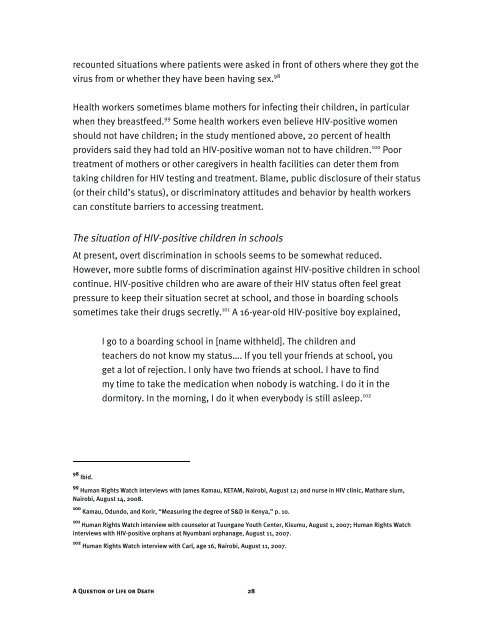A Question of Life or Death - Human Rights Watch
A Question of Life or Death - Human Rights Watch
A Question of Life or Death - Human Rights Watch
You also want an ePaper? Increase the reach of your titles
YUMPU automatically turns print PDFs into web optimized ePapers that Google loves.
ecounted situations where patients were asked in front <strong>of</strong> others where they got the<br />
virus from <strong>or</strong> whether they have been having sex. 98<br />
Health w<strong>or</strong>kers sometimes blame mothers f<strong>or</strong> infecting their children, in particular<br />
when they breastfeed. 99 Some health w<strong>or</strong>kers even believe HIV-positive women<br />
should not have children; in the study mentioned above, 20 percent <strong>of</strong> health<br />
providers said they had told an HIV-positive woman not to have children. 100 Po<strong>or</strong><br />
treatment <strong>of</strong> mothers <strong>or</strong> other caregivers in health facilities can deter them from<br />
taking children f<strong>or</strong> HIV testing and treatment. Blame, public disclosure <strong>of</strong> their status<br />
(<strong>or</strong> their child’s status), <strong>or</strong> discriminat<strong>or</strong>y attitudes and behavi<strong>or</strong> by health w<strong>or</strong>kers<br />
can constitute barriers to accessing treatment.<br />
The situation <strong>of</strong> HIV-positive children in schools<br />
At present, overt discrimination in schools seems to be somewhat reduced.<br />
However, m<strong>or</strong>e subtle f<strong>or</strong>ms <strong>of</strong> discrimination against HIV-positive children in school<br />
continue. HIV-positive children who are aware <strong>of</strong> their HIV status <strong>of</strong>ten feel great<br />
pressure to keep their situation secret at school, and those in boarding schools<br />
sometimes take their drugs secretly. 101 A 16-year-old HIV-positive boy explained,<br />
I go to a boarding school in [name withheld]. The children and<br />
teachers do not know my status…. If you tell your friends at school, you<br />
get a lot <strong>of</strong> rejection. I only have two friends at school. I have to find<br />
my time to take the medication when nobody is watching. I do it in the<br />
d<strong>or</strong>mit<strong>or</strong>y. In the m<strong>or</strong>ning, I do it when everybody is still asleep. 102<br />
98 Ibid.<br />
99 <strong>Human</strong> <strong>Rights</strong> <strong>Watch</strong> interviews with James Kamau, KETAM, Nairobi, August 12; and nurse in HIV clinic, Mathare slum,<br />
Nairobi, August 14, 2008.<br />
100 Kamau, Odundo, and K<strong>or</strong>ir, “Measuring the degree <strong>of</strong> S&D in Kenya,” p. 10.<br />
101 <strong>Human</strong> <strong>Rights</strong> <strong>Watch</strong> interview with counsel<strong>or</strong> at Tuungane Youth Center, Kisumu, August 1, 2007; <strong>Human</strong> <strong>Rights</strong> <strong>Watch</strong><br />
interviews with HIV-positive <strong>or</strong>phans at Nyumbani <strong>or</strong>phanage, August 11, 2007.<br />
102 <strong>Human</strong> <strong>Rights</strong> <strong>Watch</strong> interview with Carl, age 16, Nairobi, August 11, 2007.<br />
A <strong>Question</strong> <strong>of</strong> <strong>Life</strong> <strong>or</strong> <strong>Death</strong> 28

















